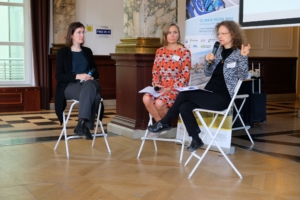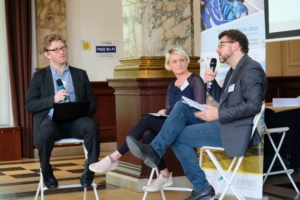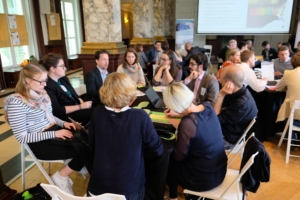Reinforcing the European Youth Employment Policy with the European Green Deal
It is urgent and necessary to act immediately on European level and in the member states against this. The already existing European Youth Guarantee has to be amplified, in order to develop an ambitious policy favouring youth qualification and employment. We propose to prepare young people for tasks and professions that are necessary for a sustainable and environmentally compatible future. The best and most convincing way to do this, will be programmes to train young people for jobs and activities that are in line with the European Green Deal.
(Not only) Europe needs urgently qualified women and men to realize the numerous tasks which are required for energy transition, for a climate-friendly mobility and climate-adaptation, for an environmental-friendly agriculture, forestry and for nature protection in general. It is absurd and unacceptable to swallow massive unemployment and social exclusion of young Europeans; if looking ahead, the EU and all member states should offer large opportunities to train them for participation in the imminent task of a European Green Deal and in a green recovery of their home-regions.
In our proposal we have
• elaborated our ideas for educational programs in technical “Green Skills” similar to offers in the German “dual system”, but focusing competence development and training in creativity , entrepreneurship and cooperative working.
• given particular attention on how to involve young Europeans (and refugees) without any work and professional qualification.
Because just these men and in particular women are suffering more and more seriously unemployment and social exclusion.
The proposal we have sent to the Commission should support the process of preparing new directives for youth employment. We have translated it in Greek and Spanish, the languages of the countries were the YES-clima project is implemented. We hope to initiate more and profound discussions and activities on how to involve the youth in the Green Deal and for their own sustainable future.
Read the full version of the proposal in:
Conference: Planning for 2050. EU experience with long-term climate strategies
The conference “Planning for 2050” took stock of the experience gained in Europe and presented lessons learnt as well as challenges encountered in different Member States – seeking to connect them to the EU’s own overall 2050 vision.
The conference brought together a range of relevant stakeholders (governments, civil society, business) in an innovative setting, with space for interaction and feedback.
During an interview session on stage, Getlyn Denks from Estonian Ministry of Environment and Dr Silke Karcher from the German Ministry for Environment emphasised the role of long-term climate planning as an opportunity to chart a clear pathway, create a shared vision across governmental stakeholders and ensuring countires can meet their climate targets without damaging their economies.
Technical experts Yves Marignac of negaWatt institute and Katarina Trstenjak from Jozef Stefan Institute emphasised the importance of clear, holisitic vision to design comprehensive decarbonisation policies and avoid emergence of counter measures that offset benefits achieved through climate policy. The experts emphasised that the challenge of achieving net-zero reduction requires systemic analysis and thinking. This includes shifting away from sectorial to cross-cutting approach in policymaking and modelling to explore new decarbonisation potentials.
During the conference participants also had a chance to participate in interactive break out sessions in smaller groups, focusing on specific technical and policy aspects of long-term climate planning. Moreover, representatives of Estonia, France and Germany presented their country’s approaches to long-term climate planning.
In the final, closing panel, representatives of European Commission (Tom van Ierland, DG CLIMA), Member State (Robert Jeszke, KOBiZE, Poland) and industry (Florie Gonsolin, CEFIC) provided their perspectives and visions for the climate-neutral EU by 2050.



